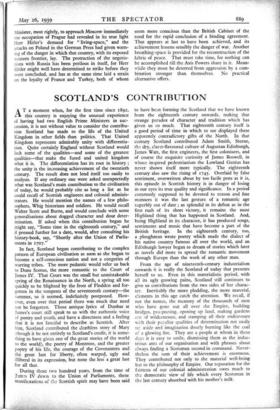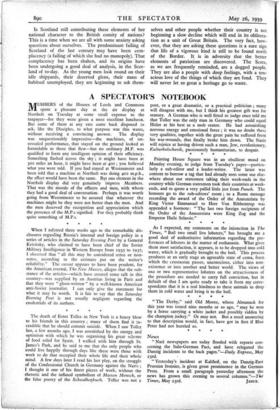SCOTLAND'S CONTRIBUTION
T a moment when, for the first time since 1892, LX this country is enjoying the unusual experience of having had two English Prime Ministers in suc- cession, it is not without value to consider the contribu- tion Scotland has made to the life of the United Kingdom in other fields than politics. That United Kingdom represents admirably unity with differentia- tion. Quite certainly England without Scotland would lack some of the qualities—and some of the greatest qualities—that make the fused and united kingdom what it is. The differentiation has its root in history ; the unity is the increasing achievement of the twentieth Lentury. The result does not lend itself too easily to analysis. If any ordinary one were asked unexpectedly what was Scotland's main contribution to the civilisation of today, he would probably cite as long a list as he could recall of Scottish engineers and colonial adminis- trators. He would mention the names of a few philo- sophers, Whig historians and soldiers. He would recall Walter Scott and Burns, and would conclude with some generalisations about dogged character and dour deter- mination. If asked when this contribution began he might say, "Some time in the eighteenth century," and if pressed further for a date, would, after consulting his history-book, say, "Shortly after the Union of Parlia- ments in 1707."
In fact, Scotland began contributing to the complex pattern of European civilisation as soon as she began to become a self-conscious nation and not a congeries of warring tribes. The more pedantic would refer us back to Duns Scotus, the more romantic to the Court of James IV. That Court was the small but unmistakeable spring of the Renaissance in the North, a spring all too quickly to be blighted by the frost of Flodden and for- gotten in the tempests of the seventeenth century—the summer, so it seemed, indefinitely postponed. How- ever, even over that period there was much that need not be forgotten. Those antique lyrics of Dunbar at James's court still speak to us with the authentic voice of poetry and youth, and have a directness and a feeling that it is not fanciful to describe as Scottish. After him, Scotland contributed the deathless story of Mary though it be not entirely to Scotland's credit, it is some- thing to have given one of the great stories of the world to the world), the poetry of Montrose, and the greater Poetry of his life, the courage of the Covenanters and the great lust for liberty, often warped, ugly and illiberal in its expression, but none the less a great lust for all that.
During these two hundred years, from the time of James IV down to the Union of Parliaments, these manifestatien.s of the Scottish spirit may have been said to have been forming the Scotland that we have known from the eighteenth century onwards, making that strange paradox of character and tradition which has given us SO much. That eighteenth century itself is a good period of time in which to see displayed these apparently contradictory gifts of the North. In that century Scotland contributed Adam Smith, Sterne, the dry, claret-flavoured culture of Augustan Edinburgh, James Watt, the first engineers, the first colonisers, and of course the exquisite curiosity of James Boswell, in whose inspired pedestrianism the Lowland Genius has never shown itself more typically. The eighteenth century also saw the rising of 1745. Overlaid by false sentiment, overwritten about by too facile pens as it is, this episode in Scottish history is in danger of losing in our eyes its true quality and significance. In a period commonly supposed to be devoted to reason and fine manners it was the last gesture of a romantic age superbly out of date ; as splendid in its defeat as in the first rush of its short victory, it remains the most Highland thing that has happened in Scotland. And, being Highland in its character, it has produced songs, sentiments and music that have become a part of the British heritage. In the eighteenth century, too, a ploughman wrote poetry which made the dialect of his native country famous all over the world, and an Edinburgh lawyer began to dream of stories which later as novels did more to spread the romantic movement through Europe than the work of any other man.
From the age of nineteenth-century industrialism onwards it is really the Scotland of today that presents herself to us. Even in this materialistic period, with all its ugly growing pains, Scotland still continues to give us contributions from the two sides of her charac- ter. Inevitably the more plodding, the more material, e!cments in this age catch the attention. We recall, if not the names, the memory of the thousands of men who have gone out all over the Empire, building bridges, pro2pecting, opening up land, making gardens out of wildernesses, and stamping all their endeavours with their peculiar qualities of determination not easily se: aside and imagination dourly burning like the coal of a glowing fire. They are a people at whom in these days it is easy to smile, dismissing them as the indus- trious ants of our organisation and with phrases about always finding a Scotsman second in command. Never- theless the sum of their achievement is enormous. They contributed not only to the material well-being but to the philosophy of Empire. Our reputation for the fairness of our colonial administration owes much to the democratic view of life which every Scotsman in the last century absorbed with his mother's milk. Is Scotland still contributing these elements of her national character to the British comity of nations? This is a time when we are all with some anxiety asking questions about ourselves. The predominant failing of Scotland of the last century may have been com- placency (a failing of which she had no monopoly). That complacency has been shaken, and its origins have been undergoing a good deal of analysis, in the Scot- land of to-day. As the young men look round on their idle shipyards, their deserted glens, their mass of habitual unemployed, they are beginning to ask them- selves and other people whether their country is not beginning a slow decline which will end in its oblitera- tion as a unit of Great Britain. The very fact, how- ever, that they are asking these questions is a sure sign that life of a vigorous kind is still to be found north of the Border. It is in adversity that the better elements of patriotism are discovered. The Scots, as we are frequently reminded, are a dogged people. They are also a people with deep feelings, with a ten- acious love of the things of which they are fond. They will never let so great a heritage go to waste.



























































 Previous page
Previous page